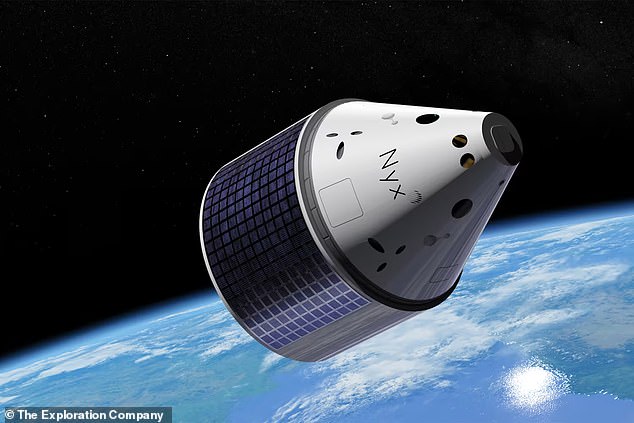
Memorial Space Capsule Carrying 166 Ashes Meets Catastrophic Demise
Space Capsule Carrying Human Ashes Lost in Pacific Ocean After Anomaly
A space capsule containing the ashes of 166 people met an unexpected end when it plunged into the Pacific Ocean during re-entry. The mission, dubbed Mission Possible, was launched on June 23 by German startup The Exploration Company (TEC) in partnership with Texas-based Celestis, a firm specializing in space burials.
The Nyx capsule aimed to fulfill participants’ posthumous wishes to “become astronauts” by carrying their ashes into orbit before returning to Earth. While the spacecraft successfully completed two orbits and initially re-established communication after atmospheric re-entry, contact was lost minutes before its planned splashdown. Celestis CEO Charles M. Chafer confirmed that “an anomaly occurred,” resulting in the capsule’s loss.

The Nyx capsule launched as part of TEC’s mission to send human remains and experiments into space.
Partial Success Amid Setbacks
TEC reported that the launch and orbital deployment proceeded smoothly, with the capsule powered as expected. However, the payload—containing cremated remains, cannabis plant matter, and seeds for a citizen science project called Martian Grow—was lost in the ocean. The cannabis experiment sought to study plant viability on Mars, pushing the boundaries of space agriculture.
Despite the mission’s abrupt end, Chafer emphasized its historic significance. “Though we cannot return the capsules, we hope families find peace knowing their loved ones orbited Earth and now rest in the Pacific, akin to a sea scattering,” he stated. The company acknowledged the mission’s partial success, noting achievements like controlled re-entry, but recognized the emotional toll on families.

Celestis CEO Charles M. Chafer described the anomaly during re-entry.
Lessons for Future Missions
This was TEC’s second capsule launch and Celestis’ first attempt at recovering orbital remains. Hélène Huby, TEC’s CEO, expressed resolve to improve: “We will learn from Mission Possible and implement these lessons in our next vehicle.” Both companies highlighted their commitment to transparency and supporting affected families.

The capsule carried cannabis seeds for the Martian Grow project, testing space agriculture potential.
Balancing Ambition and Sensitivity
While the loss underscores the risks of space innovation, TEC and Celestis framed the mission as a step toward advancing commercial spaceflight. Huby praised her team’s resilience, while Chafer reiterated their dedication to honoring participants’ legacies.

Celestis’ aerospace-grade capsule during integration ahead of the mission.
The companies aim to refine their technology for future missions, balancing ambitious goals with the profound personal meaning these journeys hold for families.
(Word count: ~600)


